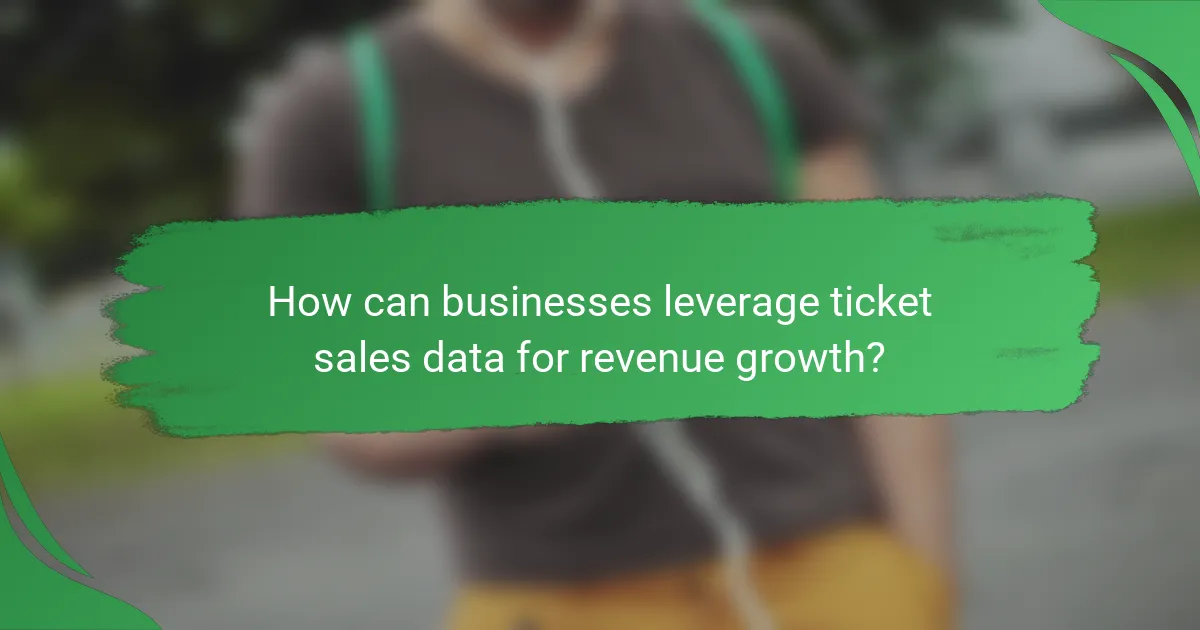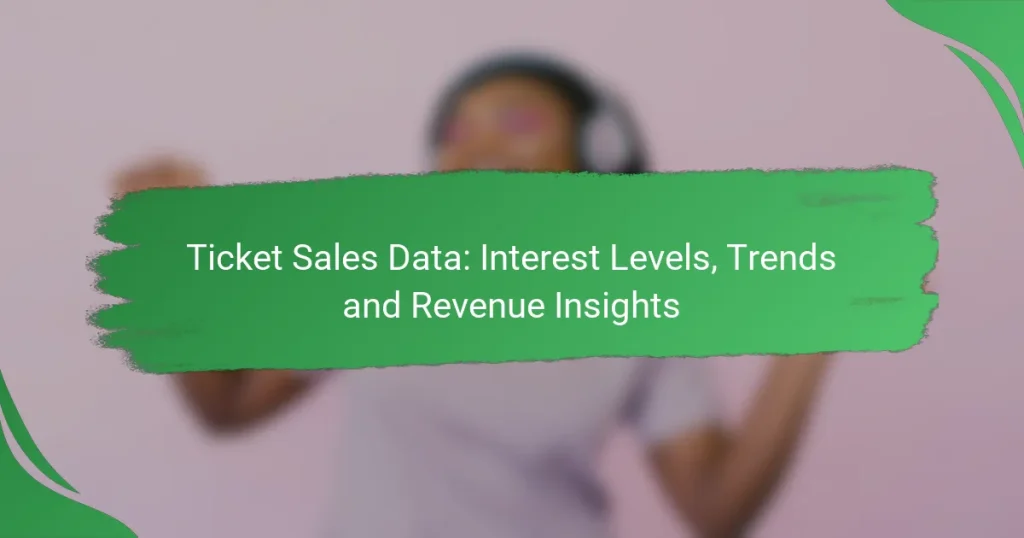Analyzing ticket sales data reveals critical insights into interest levels, trends, and revenue opportunities across various events and locations. By examining fluctuations in demand driven by factors such as event type and consumer behavior, businesses can tailor their strategies to enhance attendance and maximize profits. Understanding these dynamics is essential for event organizers and marketers aiming to thrive in the competitive landscape of live entertainment.

How do ticket sales trends vary across major US cities?
Ticket sales trends can significantly differ across major US cities due to factors like local demographics, event types, and economic conditions. Understanding these variations helps event organizers and marketers tailor their strategies to maximize attendance and revenue.
New York City ticket sales growth
New York City has experienced notable growth in ticket sales, particularly for live events such as concerts and theater performances. The city’s vibrant cultural scene, coupled with a high population density, contributes to a robust demand for tickets.
In recent years, ticket sales have surged, with some events selling out within minutes. This trend indicates a strong interest in diverse entertainment options, making it essential for organizers to leverage early-bird promotions and dynamic pricing strategies to capture this demand.
Los Angeles ticket sales fluctuations
Los Angeles ticket sales exhibit fluctuations influenced by seasonal events and the entertainment industry’s cyclical nature. Major film premieres and music festivals can lead to spikes in ticket purchases, while quieter months may see a decline.
Event organizers should monitor these trends closely and consider offering bundled packages or discounts during off-peak times to maintain steady sales. Engaging with local influencers can also help boost visibility and interest in upcoming events.
Chicago event attendance trends
Chicago’s event attendance trends reflect a growing interest in sports and music festivals, with ticket sales steadily increasing over recent years. The city’s diverse population and rich cultural heritage play a significant role in attracting attendees to various events.
To capitalize on this trend, organizers should focus on community engagement and targeted marketing campaigns. Offering early access to tickets for local residents can enhance loyalty and drive higher attendance rates for events throughout the year.

What are the current interest levels in ticket sales?
Interest levels in ticket sales have seen significant fluctuations, driven by factors such as event type, location, and consumer behavior. Currently, there is a strong demand for both concert and sports event tickets, reflecting a resurgence in live entertainment following recent global disruptions.
Concert ticket demand analysis
Concert ticket demand has rebounded notably, with many events selling out quickly. Factors influencing this demand include artist popularity, venue capacity, and ticket pricing strategies. For instance, major artists can command prices that reach hundreds of USD, while smaller acts may offer tickets in the low tens of USD.
To capitalize on this trend, promoters should consider dynamic pricing models, which adjust ticket prices based on demand. This approach can maximize revenue while ensuring accessibility for fans. Additionally, leveraging social media for marketing can enhance visibility and engagement, driving ticket sales further.
Sports event ticket purchasing behavior
Sports event ticket purchasing behavior varies significantly based on the sport and season. Fans often buy tickets well in advance for popular events, with sales peaking during the pre-season and playoff periods. Prices can range from affordable options in the low tens of USD for minor league games to several hundred USD for major league championships.
Understanding fan loyalty is crucial for optimizing ticket sales. Offering season passes or loyalty programs can encourage repeat purchases. Additionally, providing flexible payment options, such as installment plans, can make higher-priced tickets more accessible to a broader audience.

How can businesses leverage ticket sales data for revenue growth?
Businesses can leverage ticket sales data to enhance revenue by analyzing customer behavior, optimizing pricing, and tailoring marketing efforts. By understanding trends and preferences, companies can make informed decisions that directly impact their bottom line.
Dynamic pricing strategies
Dynamic pricing involves adjusting ticket prices based on demand, time, and customer behavior. This strategy allows businesses to maximize revenue by charging higher prices during peak demand periods and offering discounts during slower times. For example, a concert venue might increase ticket prices as the event date approaches, capitalizing on last-minute buyers.
To implement dynamic pricing effectively, businesses should monitor sales data regularly and use predictive analytics to forecast demand. It is crucial to strike a balance; overly aggressive pricing can alienate customers, while too many discounts may erode perceived value. A common approach is to segment pricing into tiers, offering early bird rates and premium options.
Targeted marketing campaigns
Targeted marketing campaigns utilize ticket sales data to identify specific customer segments and tailor promotional efforts accordingly. By analyzing past purchase behavior, businesses can create personalized marketing messages that resonate with different audience groups. For instance, sending exclusive offers to loyal customers can enhance engagement and encourage repeat purchases.
To execute effective targeted campaigns, businesses should segment their audience based on demographics, purchase history, and engagement levels. Utilizing email marketing, social media ads, and retargeting strategies can improve conversion rates. It’s essential to track the performance of these campaigns to refine future efforts and ensure a positive return on investment.

What are the key factors influencing ticket sales revenue?
Key factors influencing ticket sales revenue include event type, pricing strategies, marketing efforts, and seasonality. Understanding these elements helps organizers optimize sales and maximize income.
Event type impact on revenue
The type of event significantly affects ticket sales revenue. For instance, concerts and major sporting events often generate higher revenue compared to smaller community events due to larger audiences and higher ticket prices.
Different genres also attract varying demographics, which can influence pricing strategies. For example, a popular rock concert may command premium pricing, while a local theater production might rely on lower ticket prices to draw in attendees.
Seasonality effects on ticket sales
Seasonality plays a crucial role in ticket sales, with certain times of the year yielding higher revenues. For example, summer months typically see increased sales for outdoor events, while winter may boost sales for holiday-themed performances.
Organizers should consider local holidays and school schedules when planning events. Aligning events with peak times can enhance visibility and attendance, ultimately leading to increased revenue. Additionally, offering early bird discounts during off-peak seasons can help stimulate sales when demand is lower.

How do demographic factors affect ticket purchasing decisions?
Demographic factors significantly influence ticket purchasing decisions, shaping consumer preferences and spending habits. Age, income, and location play crucial roles in determining which events individuals are likely to attend and how much they are willing to spend.
Age group preferences in ticket buying
Different age groups exhibit distinct preferences when it comes to ticket purchases. Younger audiences, typically aged 18-34, often favor concerts and festivals, while older demographics may prefer theater performances or sporting events. Understanding these preferences can help event organizers tailor their marketing strategies effectively.
Moreover, the age group can impact the type of ticket pricing strategies that work best. For instance, younger consumers might be more responsive to early-bird discounts or group rates, while older attendees may prioritize premium seating options and exclusive experiences.
Income levels and ticket affordability
Income levels directly affect ticket affordability, influencing how much individuals are willing to spend on events. Higher-income consumers generally have more disposable income, allowing them to purchase premium tickets or attend multiple events. In contrast, lower-income groups may seek budget-friendly options or discounts.
Event organizers should consider offering tiered pricing structures to accommodate various income levels. For example, providing a range of ticket prices, from general admission to VIP packages, can attract a broader audience and maximize revenue potential.

What tools can analyze ticket sales data effectively?
Effective analysis of ticket sales data can be achieved using various tools that provide insights into sales performance, trends, and revenue generation. Tools like Salesforce and Tableau are popular choices, each offering unique features tailored to different analytical needs.
Salesforce for ticket sales insights
Salesforce is a robust customer relationship management (CRM) platform that helps organizations track ticket sales and customer interactions. It allows users to create detailed reports and dashboards that visualize sales data, enabling teams to identify trends and customer preferences.
To maximize its effectiveness, ensure that you integrate Salesforce with your ticketing system for real-time data updates. Utilize its analytics features to segment your audience based on purchasing behavior, which can guide targeted marketing strategies.
Tableau for visualizing ticket trends
Tableau is a powerful data visualization tool that excels in transforming complex ticket sales data into easily digestible visual formats. With its drag-and-drop interface, users can create interactive dashboards that highlight key metrics such as sales volume, revenue trends, and customer demographics.
Consider using Tableau to compare ticket sales across different events or time periods. This can help identify peak sales times or popular events, allowing for better inventory management and marketing efforts. Regularly update your data sets to maintain accurate visualizations and insights.

How do online platforms affect ticket sales?
Online platforms significantly influence ticket sales by expanding reach and streamlining the purchasing process. They provide event organizers with tools to promote events effectively, manage inventory, and analyze sales data.
Impact of Ticketmaster on sales
Ticketmaster is a dominant player in the ticket sales market, often controlling a large share of ticket distribution for major events. Its extensive network allows for high visibility, but it also means that fees can be higher, impacting overall revenue for both organizers and consumers.
Event organizers should weigh the benefits of Ticketmaster’s reach against the costs associated with its service fees. For instance, while Ticketmaster can sell tickets quickly, the added fees may deter some buyers, leading to lower overall sales for certain events.
Role of Eventbrite in event promotion
Eventbrite serves as a versatile platform for promoting smaller events and managing ticket sales. It offers user-friendly tools for event creation, ticketing, and marketing, making it accessible for organizers of all sizes.
Using Eventbrite can enhance visibility through social sharing features and integration with other marketing channels. However, organizers should be mindful of the platform’s fees, which can vary based on ticket price and sales volume, potentially affecting profit margins.

What are the emerging trends in ticket sales data?
Emerging trends in ticket sales data indicate a shift towards digital platforms, increased demand for flexible ticketing options, and a growing focus on personalized experiences. These trends reflect changing consumer preferences and advancements in technology, impacting how events are marketed and sold.
Digital Transformation in Ticket Sales
The ticket sales landscape is increasingly dominated by digital platforms, with online sales accounting for a significant portion of total transactions. Mobile ticketing apps and websites offer convenience, allowing users to purchase tickets anytime and anywhere. This shift has led to a decline in traditional box office sales, making it essential for event organizers to optimize their online presence.
Flexible Ticketing Options
Consumers now prefer flexible ticketing options, such as refundable tickets or the ability to transfer tickets to others. This trend has been driven by uncertainties surrounding events, such as weather conditions or health concerns. Event organizers should consider offering various ticket types to cater to this demand, enhancing customer satisfaction and potentially increasing sales.
Personalization and Customer Engagement
Personalization is becoming crucial in ticket sales, with data analytics enabling organizers to tailor marketing efforts to individual preferences. By analyzing past purchasing behavior, organizers can send targeted promotions and recommendations, improving engagement and conversion rates. Implementing loyalty programs or exclusive offers can further enhance customer relationships and encourage repeat purchases.


